
tulsacc.edu comm magazine spring 2024
OK 74119
Leigh B. Goodson, PhD. President & CEO
TCC Board of Regents
James H. Beavers, Chair
Samuel Combs III, Vice Chair
Paul H. Cornell, Secretary
Jennifer Jezek, Member
Caron Lawhorn, Member
Wesley G. Mitchell, Member
Peter Regan, Member
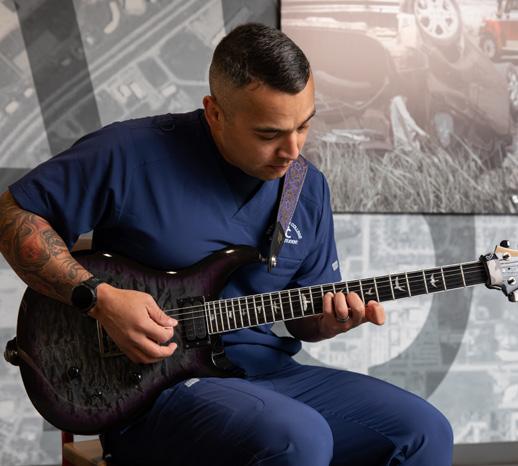

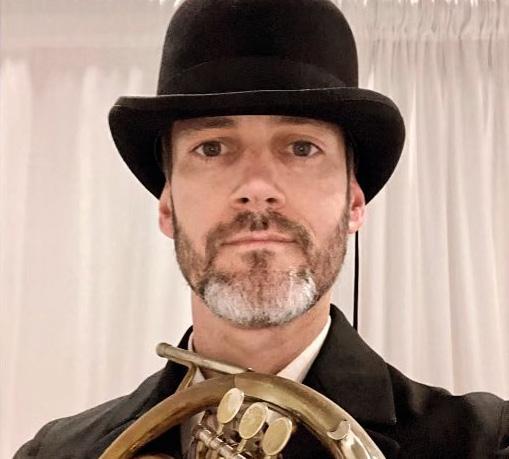
Want to opt out of this publication or access a digital version? We hate to see you go, but understand if you no longer wish to receive a printed version of Community Magazine. To opt out of future mailings, email tccfoundation@tccfoundation.org with the Subject Line: Opt Out Community Magazine.
To access a digital version, go to https://tulsacc.edu/ communitymagazine.
Notice of Non-Discrimination: Tulsa Community College is committed to establishing an environment for its students and employees that fosters inclusion, values equity and diversity, embraces and respects the dignity of people, and provides equal educational and employment opportunity. In compliance with all applicable federal and state laws and regulations the College does not discriminate on the basis of race, color, national origin, sex, age, religion, disability, status as a veteran, sexual orientation, gender identity, genetic information, or any other basis protected by applicable discrimination law in its policies, practices, or procedures. This includes, but is not limited to admissions, employment, financial aid and educational programs, activities, or services. The Civil Rights Compliance Administrator, 3727 E. Apache Room AB218, Tulsa, Oklahoma; Phone 918-595- 8487; email: CCnondiscrimination@tulsacc.edu has been designated to handle inquiries regarding non-discrimination policies. The Title IX Coordinator, 909 S. Boston Ave, Room 505, Tulsa, Oklahoma; Phone 918-595-7842; email: TCCTitleIX@tulsacc.edu has been designated to handle inquiries regarding sex discrimination, including sexual harassment, sexual assault, pregnancy, domestic violence, and stalking. This publication, printed by Meeks Group, is issued by Tulsa Community College as authorized by Title 70 O.S. 4413. 1000 copies have
contents spring 2024
a cost
$5,682.35.
Title 70 O.S.
is located at the following website(s):
4 Mastering Music and Medicine 6 Five Things with Norma Navarro-Castellanos 8 Focused on Success: First to Finish 10 TCC Reel Connections 12 College. Is It Still Worth It? Parents Weigh In. 16 Faculty Feature: Emily Quinn 18 Dual Credit Experiencing Surge in Popularity 20 TCC College Profile 22 Career Services Propels Students to Earlier Sustained Success 24 2023 Vision Dinner: Record Breaking Community Magazine is a publication of Tulsa Community College Tulsa Community College
been prepared and distributed at
of
This publication is issued by Tulsa Community College authorized by
4413 and
TulsaCC.edu/CommunityMagazine.
909 S. Boston Ave. Tulsa,
6 4 10
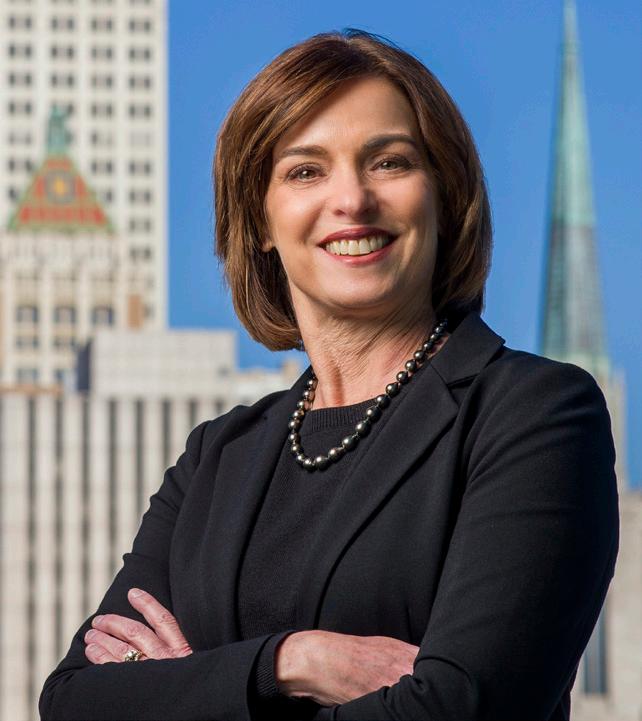
from the president
Leigh B. Goodson
A Matter of Degrees
TCC has a symbiotic relationship with the city of Tulsa and its community.
Cities that have a higher number of college graduates are typically more economically robust. Having more college graduates attracts higher quality employers who provide higher paying jobs that results in higher paid employees who then put their wages into our local economy.
It’s about degrees for mutual success.
Back when the College was founded, our city’s leaders understood the role and impact a vibrant and strong community college can have.
Did you know, seven out of 10 people in our area have either attended or know someone who’s attended TCC? The reach of the College is substantial and positive.
We know most TCC graduates choose to stay in the city and state after completing their time with us, and that’s even after they go on to complete bachelor’s degrees. We know that if they had to go back and do it again, they would still choose TCC.
We are dedicated to building success through education. That success comes from investing in our students. We provide the resources they need to achieve their goals, whether that’s financial assistance like Tulsa Achieves, or some of the many kinds of support available: tutoring, food pantries, mental health resources, and more. We provide guidance when they’re choosing their degree paths, and empathy and options when the road gets tough. We are dedicated to helping students achieve positive outcomes, which is good not only for them but for the community.
The people of Oklahoma still understand the value of a college degree. If you ask parents, and we have, they still want their children to earn a degree. If you ask high school students, they still want to attend college. If you check the data, you know a college degree is still the surest path to a higher paying career. College graduates earn more over a lifetime than someone with only a high-school degree.
It is true the definition of a “college graduate” is broadening. Our alumni complete their time with us not just with an associate degree, but often with industry-standard professional credentials. They leave us ready, whether that’s to go to work, or to continue their education.
Those are successful outcomes that represent the completion of our vision of an educated, employed and thriving community.
Thank you for continuing to support our mission and vision. Together, we build a community where we all belong, and of which we can all be proud.


AND Mastering Music Medicine
Nobody can accuse Joshua Solis of being lazy. The TCC student is a paramedic for the Owasso Fire Department.
And does triathlons.
And plays eight instruments.
But this is the norm for Solis. He’s always been the kind of person who enjoys learning new skills.
“I don’t like to be stagnant, and I like to challenge myself and always learn something new. That way I don’t get bored,” says Solis. His interest in music was sparked by his grandparents who had a small band while Solis was growing up. But it wasn’t until he joined the school band where he learned how to play his first instrument—the trombone.
From there, Solis learned how to play the baritone, stand-up bass, bass guitar, guitar, drums, and keyboard. His latest musical venture? Solis is learning to play the bagpipes.
“I went through the Honor Guard Academy at the fire department and started learning how to play the bagpipes,” he says. “It’s nine notes. Super easy, but just a lot of skills put together. How to keep pressure on the bag, how to figure the notes and there’s different nuances about that. But it’s something that I enjoy.”
Solis joined the Marine Corps after high school where he experienced a culture of companionship, something that also drew him to service in the fire department.
“I was in the infantry there and I enjoyed that brotherhood. I liked that camaraderie. I leaned towards the fire service because it was kind of the same environment. I’ve always been the type to chase things that are difficult, so I wanted to become a paramedic and have a new set of skills.”
Solis first enrolled in TCC in 2020, earning his Fire & Emergency Medical Service Technology A.A.S. and Healthcare Specialist/ Paramedic A.A.S. Now in his mid-30s, Solis is thinking about his second act.
“I’m halfway through my fire career. I started at 25 and in 10 years I’ll be 45, and what am I going to do then? So, I decided to build on the skills I already have,” says Solis.
He is now on the path to becoming a Registered Nurse, while continuing to work full-time. Solis is using his certifications from the fire department to transfer into credit hours at TCC, utilizing the schooling and skills he already has to become an RN quicker.
“That will set me up once I retire from the fire department. I’ll have another career or even a second job that I can utilize now, like a lot of firemen do,” he says.
Solis has maintained a 4.0 GPA throughout college while being a TCC Peer Health Educator, working full-time, making time to play music, and training for triathlons, which his wife has joined him in.
“My wife’s very understanding of my schedule, and it actually inspired her to do her first 70.3 Ironman, which is a half Ironman triathlon. So, she developed a new skill, too.”
Solis expects to graduate in Fall 2024 and plans to pursue an RN position in cardiology. How does he do it all?
I think you have to make time for the things that make you happy
“I think you have to make time for the things that make you happy,” says Solis. “Time management is really important. Be disciplined to do the things that need to get done so you have time for the things you want to do.”

5 Community Magazine | Spring 2024 | tulsacc.edu

Things Five
with Norma Navarro-Castellanos
Tulsa
Trading in the bone-dry deserts of Arizona for the sprawling prairies of Oklahoma, Norma Navarro-Castellanos moved to Tulsa in Summer 2022 after she was hired as TCC’s assistant vice president of Financial Aid.
Prior to the move, she lived her entire life in southern Arizona, where she was born, met her husband, and had three children. But NavarroCastellanos says she knew it was time for a change.
“When this job opportunity presented itself, I was like, ‘This is the perfect time to go somewhere different’,” says Navarro-Castellanos.
“Sometimes when you get that itch, you want to go on an adventure. That’s just how I function. I guess you can call it a midlife crisis or something.”
The plan was for Navarro-Castellanos to make the move solo first to allow her son to finish the school year. But that plan was turned on its head when she was diagnosed with lymphoma a few months later. She started treatment immediately with her support system 1,000 miles away.
“My first few rounds of treatment were in Tulsa. My family was traveling here but it got difficult on them logistically trying to figure out whose turn it is to come and that sort of thing,” she says.
With the support of TCC, Navarro-Castellanos went to Arizona in January to finish treatment with her family. In June, she returned to Tulsa in remission and with her family.
“We’ve definitely been taking this as an adventure despite the kind of year that we’ve had,” says Navarro-Castellanos. “We didn’t let that deter us. We kept saying, ‘This is where our new home is going to be’. And we’re very comfortable and happy here.”
Tucson
Five Things Navarro-Castellanos Found Surprising About Tulsa
It’s so green!
I’m a desert dweller, so it’s very different for me being around all this greenery. I was surprised that there’s a lot of bodies of water, because you don’t think about that when you think of landlocked states. There’s the Arkansas River and all these lakes surrounding us. It’s by far more water than what I used to see.
The sunsets remind me of the Southwest.
I love the outdoors and I love sunsets. The ones here remind me of sunsets in Arizona with those orange and purple hues. You can get a great sunset view on Turkey Mountain.
The museums and cultural events are awesome.
3 4 2 1 5
The Philbrook Museum was one of the first places I had to check out. I visited during the Frida Kahlo exhibit, and it was just stunning. I went there with one of my daughters and we spent the entire afternoon there. We lost track of time and got locked in the outdoors area when they were closing! It was like an adventure. We were waving our hands at the cameras trying to catch their attention to let us
out. Afterward we went to Shades of Brown, which is now one of our favorite coffee shops.
The people are very kind and so polite.
Everyone has been so welcoming to us. Tulsa is a big city, but you get to know people and people are willing to get to know you too, and embrace you, and I really like that. I love hearing the accents and phrases people use here, like “I’m fixing to” or “Bless your heart”.
Route 66 culture is so unique.
My children and I took a road trip to Tulsa on Route 66 in June 2022. It was a funny thing because my daughters are in college and they said, “It feels like the reverse is happening here. Like we’re taking you to college to drop you off.” We drove from Tucson up to Albuquerque and then over to Tulsa entirely on Route 66. We made all the stops at cute, quaint towns along the way and quirky gas stations and little joints and dives. I really like Buck Atom’s and the giant statue.
7 Community Magazine | Spring 2024 | tulsacc.edu
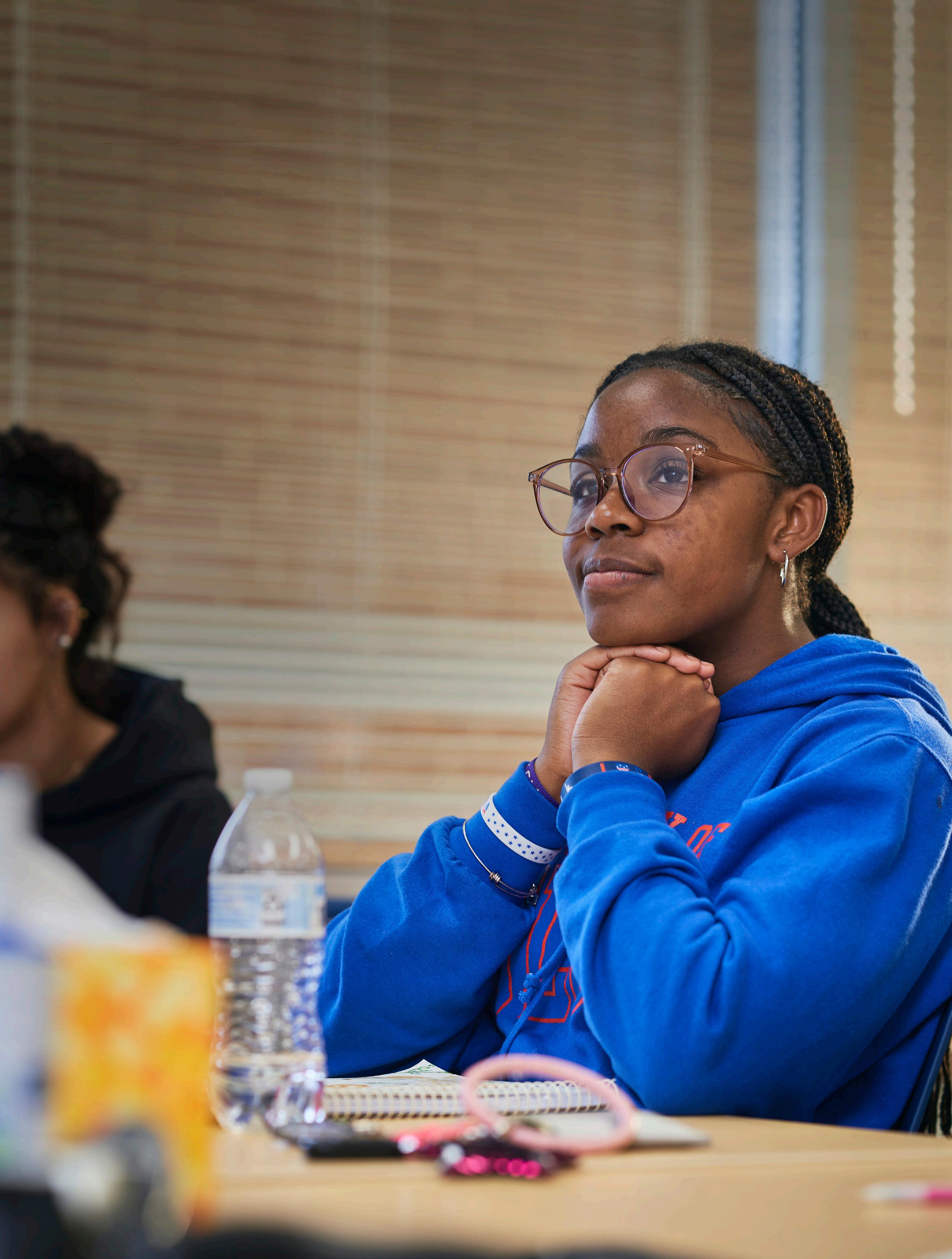
Focused on Success:
TCC’S FIRST TO FINISH PROGRAM PROMOTES PROGRESS
students come from a wide variety of backgrounds. According to TCC’s TRIO Student Support Services, 27 percent of students identify themselves as the first in their families to go to college – also known as “first-gen.”
Some students have parents who’ve completed an associate degree, but not a bachelor’s; some finished formal education in high school.
For students who are not familiar with the college journey, TCC’s First to Finish is a way to help. The program operates through TCC Career Services, employing a span of strategies and activities that focus on first-gen students, including providing wraparound services, mentors, and support designed to encourage success.
“We endeavor to be a place of access like no other,” says Eunice Tarver, Ph.D., TCC vice president of Student Success & Engagement. “By helping those who need it most—those unfamiliar with the ‘hidden rules’ of higher education, or who don’t have a network to show them how to be successful in college—we are helping change the trajectory of both their family and the community as a whole.
“There’s so much to learn about the college experience outside of the classroom. You have to know about the competing life challenges of our students; sometimes, students don’t have the time to figure out the various supports we offer, and our challenge is to make sure we are creating a pathway full of wraparound support we know our students— particularly the most marginalized—need.”
In collaboration with the City of Tulsa’s 211 service, TCC is launching the Help Hub, a comprehensive web of people invested in seeing students succeed. Help Hub will be a one-stop shop at the TCC Northeast campus where students can get support, including a Fuel Pantry (food, hygiene products, and more), and access to resources on campus to help with transportation and housing.
Connection is key to success.
“Our staff is still talking about the ripple effect of isolation during the COVID-19 pandemic,” says Dr. Tarver. “For our First to Finish students, we offer mentoring with alumni. We create spaces across campus to help them find connections. We provide group study rooms specifically for first-gen students, TRIO learning centers, and significant wellness support.”
TCC is also one of 349 partner schools for NASPA, a national organization of Student Affairs Administrators in Higher Education. Dr. Tarver calls them the “north star of best practices, promising practices.”
“TCC is an open-access institution, and we are obligated to make sure students finish strong and well-prepared for the next steps in their education, or career, or both,” she says.
We endeavor to be a place of access like no other.
Even after 13 years at TCC, Dr. Tarver recalls clearly one of her most significant student encounters.
“One of our students was experiencing homelessness, living in a shelter when he could. We were his support system. He ended up graduating from TCC, and then went on to earn not just his bachelor’s degree, but also his master’s degree in social work. He worked with nonprofits and became a counselor. He raised funds for his work, providing pairs of socks and gloves for those living in different encampments. He is the epitome of what can happen with the right amount of support.”
Over the next few years, the College will emphasize equitable success for the First to Finish students.
“We are part of a collaboration in unlocking opportunities for postgraduation success,” she says. “The three-year graduation rate is 24 percent. We want our first-gen students to graduate at the same rate or better rate than the overall graduation rate.”
9 Community Magazine | Spring 2024 | tulsacc.edu
TCC
Action, Cut, Print:
TCC Makes its Mark in the Movies
NThough longtime Tulsans remember when future stars like Tom Cruise, Rob Lowe, and Matt Dillon filmed The Outsiders, Tex, and Rumble Fish in Tulsa in the 1980s, the recent influx of television and film industry professionals has meant celebrity encounters galore.
Over the last few years, our area has hosted the production of major box office blockbuster Killers of the Flower Moon, as well as the television movie A Christmas … Present (starring Candace Cameron Bure and filmed in Claremore and Owasso), Hulu’s Reservation Dogs (shot with a nearly all-Native cast and created by Sterlin Harjo), Tulsa King (starring Sylvester Stallone) on Paramount+, and 2024’s Twisters (sequel to 1996’s smash Twister).
From Symphony Manager to U.S. Marshal
The uptick in film and television activity has captured the attention of many around the state and inspired some to make a go at the business, including some TCC staff. Joe Falvey, orchestra manager (and member) of TCC’s Signature Symphony and adjunct faculty member, is a natural— he’s been performing since the sixth grade, playing the French Horn. Falvey worked as an extra on Killers of the Flower Moon, ultimately being placed in multiple scenes as different characters.
“The casting company was looking for men to march in a band,” says Falvey. “I applied and was chosen. They needed so many extras for other things. After looking at costumes, they moved me into different roles. Wrangling extras takes a lot of coordination, as there are days

with hundreds of extras, and hundreds of crew members and medical professionals on set.”
In addition to marching in the band, Falvey ended up being called to portray a banker and a U.S. Marshal, complete with prop gun and badge, in the scene where FBI agents (spoiler alert!) take Leonardo DiCaprio’s character into custody. Falvey was also trained to drive a Model T for a scene and filmed a gunfight.
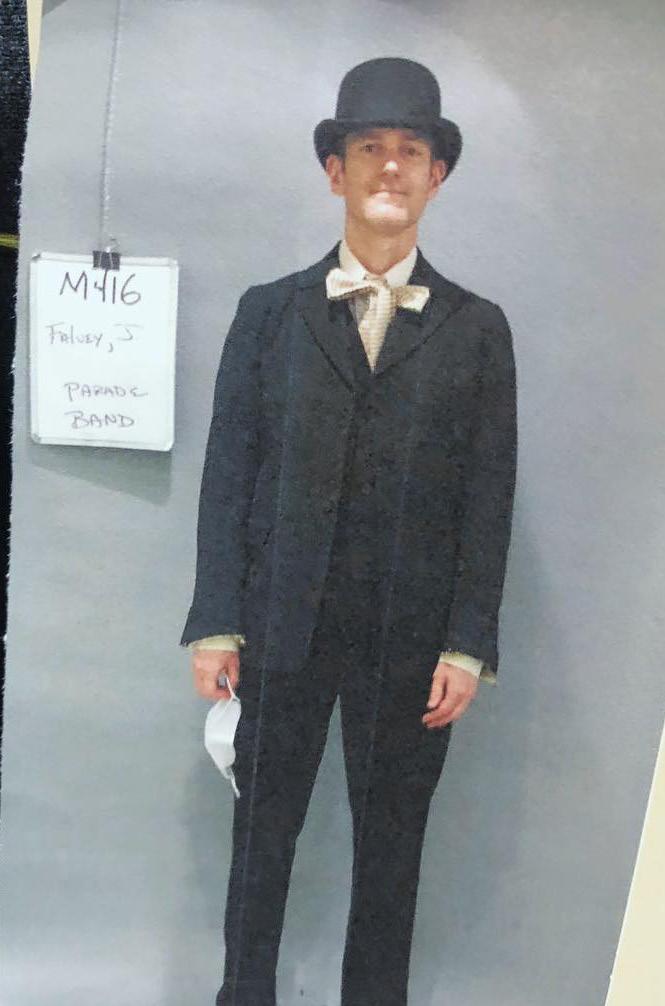
“The whole experience was pretty fun,” Falvey says. Since then, Falvey has participated in the filming of Tulsa King and A Christmas … Present
No one will get rich being an extra in films, Falvey notes, with smaller productions paying about $8 an hour, and bigger productions paying $10 an hour (before overtime) for a 10-hourminimum day. But Falvey says he enjoys it and is pursuing other industry opportunities.
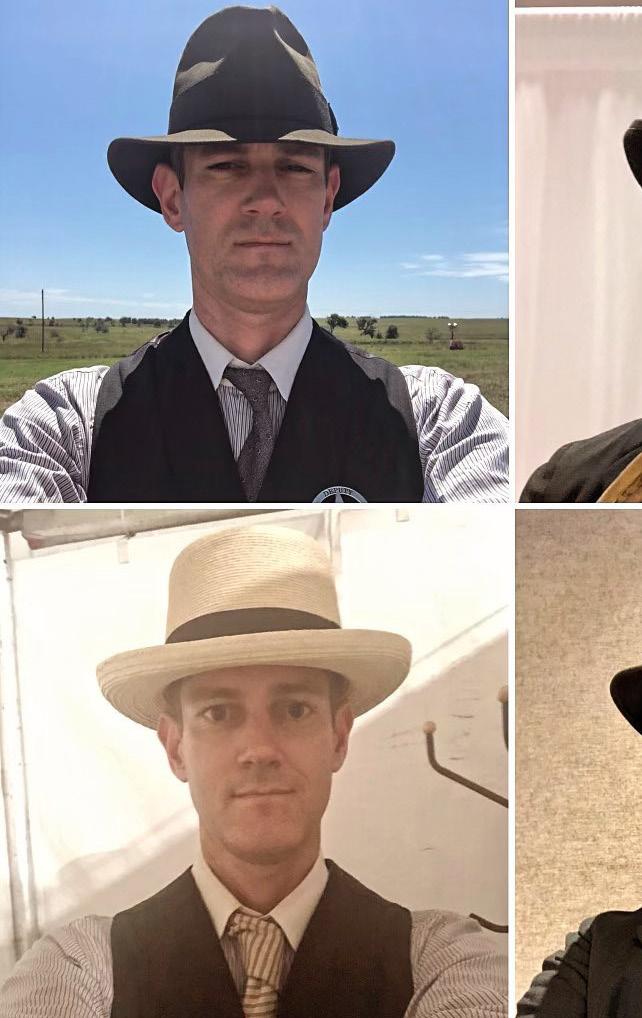
Dean by Day; Tulsa King’s Dinner Guest After Hours
TCC’s Dean of the Thomas K. McKeon Center for Creativity, Annina Collier, has approached her foray into the film and television industry from a different perspective. Because the Center often hosts workshops and opportunities for performance through storytelling, Collier wanted to understand firsthand how the TV and film industry was developing in Tulsa and the state to see how the Center could get involved.
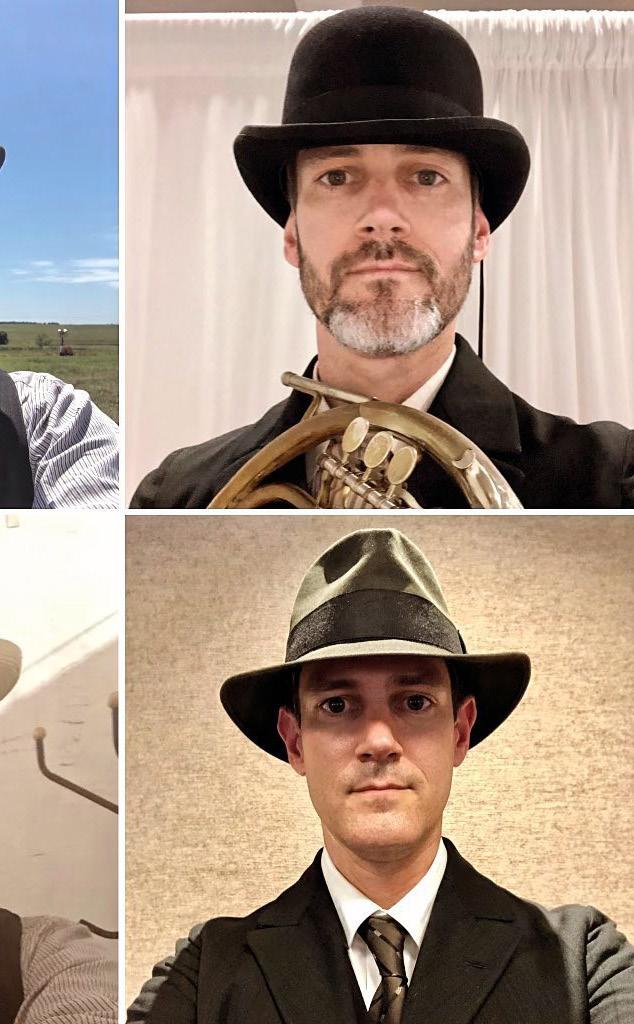
“I knew someone who’d been an extra on the Killers set and had heard it was relatively simple to apply to be a background actor, or extra,” says Collier.
“Part of our job at TCC is to prepare our students to be part of the workforce, and through the Center for Creativity, I want to help connect people with creative outlets.”
Collier was working through casting calls, signing up but not getting called, when she saw a call for people who looked Italian. “I’m half Italian and was cast as a woman at a funeral for an episode of Tulsa King.”
Collier also ended up sitting at a dinner table with Sylvester Stallone for a scene. “It was a totally unexpected and crazy experience. There was a problem with another actor, and, at the last minute, they needed someone to portray the wife of Stallone’s character’s nephew.”
Collier also worked on Twisters, portraying a truck stop server, and an Italian maid in the upcoming The Book of Jobs, about a girl raised in Silicon Valley in the shadow of Steve Jobs’ successful return to Apple.
“I’ve gained a better understanding of the culture of the film industry,” says Collier. “A side benefit to the acting experiences is that TCC is starting to get requests to use our production studio, parking lots, and the Center for Creativity itself.”
The Center for Creativity recently hosted IllumiNative, a company the partners with and educates industry leaders and professionals to combat negative stereotypes and remove barriers for Native creatives.
“The session featured a discussion of how Osage elders and leaders worked with Martin Scorsese when he was filming Killers here,” said Collier. “The film industry works quickly and at all hours—quite different from the College—and this experience has helped me bridge those two worlds. We will be doing more with film and television, so the more firsthand experience I have, the better I can understand what they’re doing.”

Grunt Work Pays Off
In addition to background acting, the film industry employs hundreds of local people for medical, construction, and production work, props, costumes, makeup, wardrobe, bus drivers, and more. That type of work is very familiar to Kelly Clark, the dean of Visual and Performing Arts for TCC. Her history in the TV and film business started long ago, when her sister was cast in the early ‘70s for Where the Red Fern Grows
“We went to Tahlequah every day during filming,” says Clark. “ThenGovernor George Nigh put together a film task force, and my mom served as its commissioner for 14 years.”
When Tex was filmed in the Tulsa area, Clark was cast as one of 5,000 extras. Her willingness to do whatever she was asked (“Hey, hand me that sandbag”) got her an opportunity to work in the wardrobe department. Kelly then served as a production assistant (PA) for the wardrobe department on The Outsiders, getting to know (director) Francis Ford Coppola, who ultimately cast Clark in an on-screen role.
Clark worked as a PA on movie sets for 10 years in Tulsa, Kansas, Missouri, and California.
“When you’re a PA, and they need an extra, they put you in costume and on camera,” says Clark. “I worked on several films, but Outsiders was probably the only closeup extra work I did.” Clark then went on to work at NBC’s Today Show, which she believes prepared her well for her role at TCC.
“My advice for those who want to break into the business: go and work your hardest and play heads up—listen for someone to ask for something like handing them a sandbag,” said Clark. “Jump in, help, and volunteer. You must be willing to work the hours and put in the time and NEVER think you’re too good to do hard work.
It’s not glamorous work; it’s grunt work a lot of times, but it pays off in the end.”
11 Community Magazine | Spring 2024 | tulsacc.edu
College. Is It Still Worth It?
Parents Weigh In.

The cost of college continues to climb.
According to the Education Data Initiative, the average cost of attendance for one academic year at any post-secondary institution in the United States is $25,281. Since 1990, average tuition and fee rates overall have increased 130% (after adjusting for inflation).
Investment in any type of education after high school can be significant, no matter what type of post-secondary credential is being pursued: associate, bachelor’s, vocational, and specialty certifications. Is the investment worth it?
TCC worked with Scoutly Brand Research & Strategy to answer that question, and more. They assembled parent discussion groups, hoping to understand the current mindset of parents and guardians of high school students around higher education choice. The groups represented a broad mix of socioeconomic factors, and opinions and expectations ranged from the expected to the surprising.
“There has been a shift in how a four-year degree is viewed in terms of value,” says Stephanie Wheet of Scoutly. “Parents say it really depends on the student—the same parent may have a child who is wired for success at trade school or a two-year college program, one who’s destined for the traditional four-year college path, and one who isn’t quite ready to make a decision at all.
“Overwhelmingly, the adults we spoke with said any post-secondary education is too expensive to not make a practical decision.”
While parents in the group said cost hasn’t altered their perceptions of the benefits of education, what has changed is the conversation about which option is pursued.
“The process of looking into financial aid and scholarships can be overwhelming for the student and the parents, particularly for the oldest in the family. They are looking for more resources as to how other people navigate the process and have success.”
One surprising takeaway from the discussion groups: When asked, “What is the information you as parents need to know in order to help your child make a good decision about where to go and for what,” the expected answer was related to knowing their choices—the more practical aspects of choosing a college or school. However, the parents said overwhelmingly that the piece of information they need to help their kids make a good decision is the answer to the question, “What do you want to do for the rest of your life?”
Because most high school-age students don’t know what they want to do next weekend, much less for the rest of their lives, the cost of any program must be weighed heavily.
One of the parents in the discussion groups says parental involvement in the decision-making process is critical.
“Though kids want to listen to others rather than their parents classmates, counselors, teachers—the paperwork, conversations about how far away to go, and what the child and parents can afford are all very important,” says Melissa, the mother of two sons. “I went to TCC years ago when I was a single parent; I started with a certificate, and am now on track to finish my MBA in 2026. I would recommend people consider TCC as one of their post-high school choices.”
Melissa had one suggestion for TCC as they expand their reach into schools. “There needs to be more outreach to parents of minorities,” she said. “When higher education has not always been a focus in the family, someone saying ‘this could be a life-changer for you’ is pretty powerful.”
13 Community Magazine | Spring 2024 | tulsacc.edu


A Fourth Generation Educator
B faculty feature: Emily Quinn
eing an educator is in Emily Quinn’s blood ... literally.
She is a fourth-generation educator as an Assistant Professor of Math at Tulsa Community College. Her mother was a Pre-K teacher, her maternal grandfather taught history, her maternal greatgrandmother taught in a one-room schoolhouse and her great-grandfather was a principal. In addition, her sister is a fourth-grade teacher.
“Growing up, I always enjoyed helping my mom in her class. I saw how many people you could impact,” says Quinn. “I also worked with the Boys and Girls Club during high school in a tutoring and leadership role. It never felt like work.”
She also heard multiple stories about her family and their love for the education profession as she grew up.
“One funny story about my greatgrandmother, who taught in a one-room classroom, always stood out to me. One day, she fired the babysitter and took her son, my grandfather, who was still a baby, to school with her. He slept in a box on her desk. She wasn’t letting anything stop her from teaching.”
When Quinn was in high school, her English teacher had the class write individual letters to themselves focusing on what they expected to be doing in 10 years. The teacher promised to mail the letters
to the students. After forgetting about the assignment, Quinn received the letter just as promised 10 years later.
“I couldn’t believe it when I opened the letter. I wrote that I wanted to be a math professor,” says Quinn who was working as an adjunct faculty at TCC at the time. “I had completely forgotten that I wanted to teach at the college level. Somewhere along the way I thought I wanted to teach middle school or high school math.”
She took the K-12 path after receiving her bachelor’s degree from Northeastern State University and her master’s degree from Oklahoma State University. “I taught middle school math for about four years, only to realize that wasn’t the best place for me.”
Leaving that job was scary and she wasn’t sure what to do next.
“I took a job as an adjunct at TCC, and I absolutely loved the college level,” says Quinn, who was hired as full-time faculty in 2018 and was selected as a chair for the Math department in 2022.
“Community college is definitely my sweet spot. It is exactly what I want to do for the rest of my life. I really like the challenge of teaching classes where the students aren’t there because they love math; they are there because they have to be. As a math instructor, you’re used to walking into a class full of students who already don’t like
you because you’re their math teacher. I think it’s a huge part of my job to help them grow an appreciation for, if not a love, for math. Every semester, I want students to say, ‘Wow, that was interesting’ or ‘that was useful’ or ‘I can do this.’
Community college is definitely my sweet spot. It is exactly what I want to do for the rest of my life.
Her syllabus includes a section where she challenges her students to consider what they want to get from her math class.
“In my syllabus, I have the institutional learning outcomes,” says Quinn, “but I also include a section of what I personally want students to get out of their class ... things like -- recognizing math in the media and out in the world; having faith that you can pass your next math class. And if those things happen regardless of their grade, they’ve made progress ... they’ve grown.
“TCC students are looking for ways to improve their situations and their lives and the lives of their family, in whatever form that comes. And if we can help them do that, that’s the main goal.”

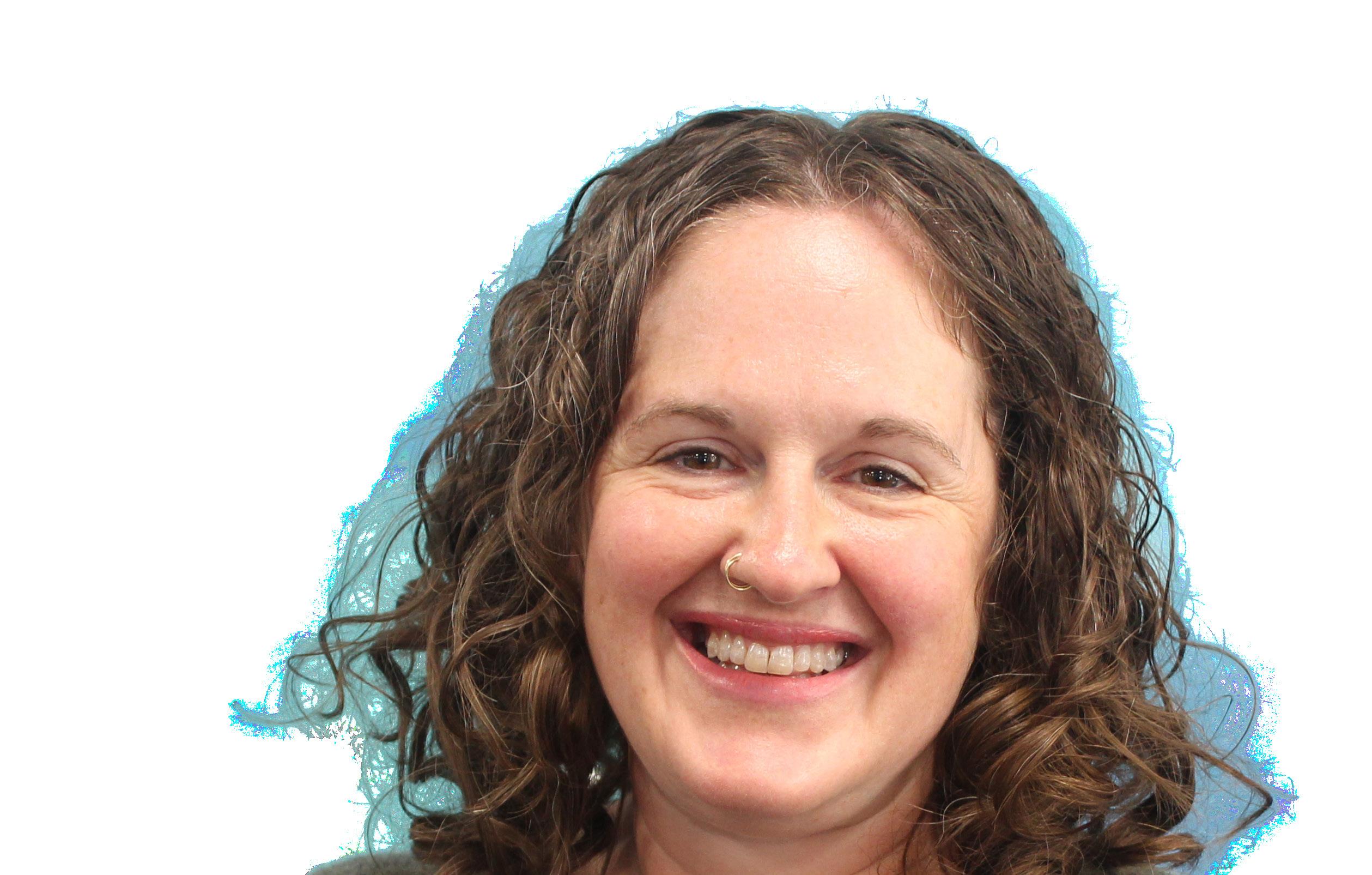
DUAL CREDIT EXPERIENCING SURGE IN POPULARITY
Cost is one of the most cited roadblocks to pursuing education after high school.
TCC works to make achievement of higher education—associate degrees, bachelor’s degrees, and career and technical education certificates—more accessible and affordable in the short-term and long run through dual credit programs. Also referred to as dual enrollment, these programs allow high school students to take college-level classes at their high school, at a community college, or online. When the student passes the class, it counts for both high school and college credit. The types of dual credit classes offered varies by school district, and many high schools include introductory college coursework in subjects like Humanities, English, Math, Social Studies, and Science.
Lissa Steadley, MA, MPM, serves as director, Dual Credit Programs at TCC. Steadley says her background in industrial-organizational psychology translates well to her work.
“A lot of I/O psychology is partnership of teams and work inside organizations—the psychology of work and the psychology of organizations,” says Steadley. “We have 170 high schools in Oklahoma, and each has its own culture and needs. I/O psychology teaches us to listen to what people need and learn best how to help them.”
One of the biggest challenges of helping high school students earn these credits involves influence.
“We work with every department, every academic school within the college. We do that successfully by partnering with people who have like-minded goals for successful students,” says Steadley.
In order to maximize critical communication, each day the teams on each campus meet to talk about priorities and what they need from each other to succeed.
“Every 16 weeks, we get to improve something,” says Steadley. “We are on a continuous quality improvement cycle, helping our employees look at the processes we use, evaluate what just happened, and get ready for the next iteration. We enrolled in August, and just started at the end of October to evaluate ourselves, our wonderful external partners, and
our team, to see how we can streamline processes to make the student/ partner/employee experience better.
“We are on track to graduate almost 90 students in May with twoyear associate degrees,” adds Steadley. “Our goal has been to graduate 125 by 2025, and we will meet that goal with more than 130 students scheduled right now to graduate in 2025.”
Nearly 20 percent of the unduplicated head count at TCC is high school students, up from 9 percent when Steadley began working at TCC. Why are dual credit programs so attractive?
“It’s the most economical way to get a higher education degree,” Steadley says. “Universities are very expensive, and this is a great way to get ahead financially. Second, this is the most supported way to start college. We have a lot of safety nets under these students; with maximum class sizes of 20-30 students, this is a very supported way to learn to navigate a new system like college.”
TCC’s Dual Credit program support includes an orientation geared to the young, first-time students who are navigating two very different worlds; they learn about everything from not needing to ask for a pass to be excused from the classroom to preparing them for the amount of reading, writing, and coursework that must be completed outside of class time. Impressively, more than 90% of high school students enrolled in TCC’s program are making C’s or better in all their classes.
Like other departments at TCC, the Dual Credit team works with highly respected national organizations to share information, using what they learn to implement best practices in Tulsa. TCC is a member of NACEP, the National Alliance of Concurrent Enrollment Partnerships. In October, Steadley and members of her team attended the NACEP Accreditation Institute—the first step toward beginning a two-year accreditation process.
Other exciting dual credit developments include the coming launch of an AAS (Associate of Applied Science), a workforce/work-ready degree, for the dual credit program, funded in part by a $1.6M Department of Labor grant to expand TCC’s program. Right now, students are able to transfer directly to a four-year program only; this program expansion

will use apprenticeships, internships, and national certifications to enable students who want to start their careers promptly or don’t want to go on to a 4-year degree program.
“This AAS degree carries college credit,” says Steadley. “Eighteen general education credit hours in core requirements like Composition, History, English, and more will transfer to other colleges and universities.”
Many students make a permanent impression on the Dual Credit team. “A couple of years ago, we had a first-generation, under-resourced, Hispanic young lady who went to work at four o’clock in the morning, and then to a small rural high school. There, she participated in athletics, and then to TCC in the afternoons and evenings,” says Steadley.
“This impressive young woman graduated with not one but two associate degrees in May of her senior year, transferred to OU in Norman to finish her bachelor’s degree, and is currently an auditor for the state of Oklahoma. She is only one example of thousands of high school students who have goals and dreams. We are so thrilled that we got to help her get started through TCC dual credit programs.”
Steadley credits the enthusiasm and passion of a big group with the success of the program. “Professors, TCC staff, K-12 districts’ staff, and high school staff make this all possible. The saying ‘it takes a village’ is a cliché, but it takes community… maybe that’s why Community is our middle name.”
A study from the Community College Research Center (CCRC) found that 88% of dual/concurrent enrollment students went on to college after high school and completed degrees at higher rates and in less time than their non-participating peers.
Participating in dual/concurrent enrollment has a positive impact on college-going rates of students from low socioeconomic backgrounds. Research shows that students from low-income backgrounds and/or school districts who participated in dual/ concurrent enrollment were nearly 10% more likely to enter college after high school graduation than their non-participating peers.
Students in majority-minority school districts that participated in dual/concurrent enrollment were 32-56% more likely to go on to college after high school than non-participating students in the same school district.
Source: NACEP.org
19 Community Magazine | Spring 2024 | tulsacc.edu
> > >
College Profile 2023+
20,071
Total Credit Enrollment
4,598 Full-Time Students* 9,792 Part-Time Students* 3,089 First-Time Entering Students* 2,811 Dual Credit Enrollment*
2,703 Continuing Ed Enrollment
Increase in Degrees & Certificates Since 2016
More Oklahoma residents attend TCC than any other college in the state
2,433
Total Graduates+ Most graduates in TCC history 23%
STUDENT DIVERSITY*
White
Two or More
Hispanic/Latino
Black
American Indian/ Alaska Native Asian
Unknown
Int Non-Resident
Native Hawaiian/ Pacific Islander
23
TCC Student* 50% Minority Percentage
TOP 10 DEGREES
Liberal Arts
Business Administration
Enterprise Development
Pre-Nursing
Nursing
Social Science: Psychology
Computer Information Systems
Biology
Mathematics
Teacher Certification Transfer
Average
of
Age
Updated October 2023 +Academic year 2022-2023 data *Preliminary Fall 2023 data 48% 16% 13% 7% 7% 5% 1% 2% <1%
$4,524,405 $57,203,548 70.7%
$2,156,621 $305,094 1,062
21 Community Magazine | Winter 2023-2024 | tulsacc.edu
TOP TRANSFER UNIVERSITIES $ Oklahoma State University - Stillwater/Tulsa Northeaster State University University of Oklahoma The University of Tulsa Rogers State University Oral Roberts University University of Central Oklahoma Oklahoma State University Institute of Technology University of Arkansas at Fayetteville University of Oklahoma Health Sciences Center 31% 19.9% 11.5% 5.7% 5.5% 3.3% 3.2% 3.0% 1.9% 0.9%
Enrollment* Service Hours Since 2007
Financial Aid
TCC Foundation Total
Enrollment
2/3 of TCC students plan to transfer to a university About
Total Financial Aid
Tulsa Achieves Financial Aid Awards 3,079 936,661
Oklahoma’s Promise
Awards
Scholarships Awarded
graduating students finish debt-free
of
Propels Students To Earlier Sustained Success Career Services

Services
Career Services is much more than help with resumes and job listings. As the workplace has grown more sophisticated, so has TCC’s Career Services.
Right now, TCC students have access to the same training courses available to employees in Fortune 500 companies,
Two hundred Fortune 500 companies are connected to TCC through a sophisticated labor market software program that produces career simulations in business, IT, HR, sales & marketing, and more. In just six hours, one of these simulations offers a TCC student the same training as their own employees, and a new level of experience to use going forward.
These career simulations, microinternships, traditional internships, and a video resume concept called “Me in 3,” are just some of the forward-thinking tools TCC’s Career Services department offers.
“The average student at TCC is 23 years old,” says Mark Hays, MPA, director of Career/Retention Programs at TCC. “We’re dedicated to shaping students, and more important, future professionals. Our goal is to propel you toward success, offering guidance and resources for your professional journey. Whether you’re exploring career options, seeking internships, or preparing for the workforce, our team is here to support and guide you at every step of the way.”
Not every student at TCC is seeking a four-year degree. Increasingly, Hays says, non-traditional students are pursuing advanced training and education in hopes
of getting a higher paying career started more quickly or advancing where they are already working.
“’What skills does this worker have?’ is a more common question being asked now,” says Hays. “The student is asking ‘What can I accomplish in two months?’ because that’s the amount of time they have. We have to be able to respond to that and get them in a program that will help.”
Hays is encouraged by what TCC is doing to change how to help the students by finding a way to credit them for prior learning and life experience, like serving in the military or a previous career. “We want to support students who need to get into workforce as quickly as possible, so they can come back later and finish their degree if they want to.”
A typical day in Career Services involves doing several expected tasks: help with resumes, mock interviewing, cover letters. But TCC offers more.
“We’ve started sharing information about what the Tulsa labor market is like, what jobs are out there and what they pay, the growth rate, and what education students need to get those jobs,” says Hays. “This has proven especially helpful for young adults who may not have any idea what they want to do with their lives but have heard ‘you have to go to college’ or ‘just get a degree—in anything’ because that’s not the case anymore. They have to be strategic about career moves and know what to take in college to meet the demands of the labor market. We want students to understand what Tulsa looks like because we want them to stay here.”
Career Services can assist with a student’s LinkedIn presence, a resume, cover letters, and more. While Hays says they visit with most students in March and April each
Career Services is much more than help with resumes and job listings.
year, they are working to reach students earlier in the year, and to work closer with the faculty who interact with students daily.
One of Hays’ favorite Career Services success stories involves a young female student. “This student, who is neurodiverse, was asking for help dealing with the anxieties of applying for a job in the health information technology division at a local hospital. We worked with her on her interviewing skills, and worked with the hospital to ask for accommodations so she would have the best chances for success working there.”
“Getting students to visit us is a challenge we’re working on,” says Hays. “Because people communicate mostly through text and email, it’s more important than ever we help students realize the importance of looking an interviewer in the eye, be outgoing in the interview. We want to get the students out of their shell and teach them to show the personality the employer wants and can engage with, especially with public-facing roles.”
23 Community Magazine | Spring 2024 | tulsacc.edu



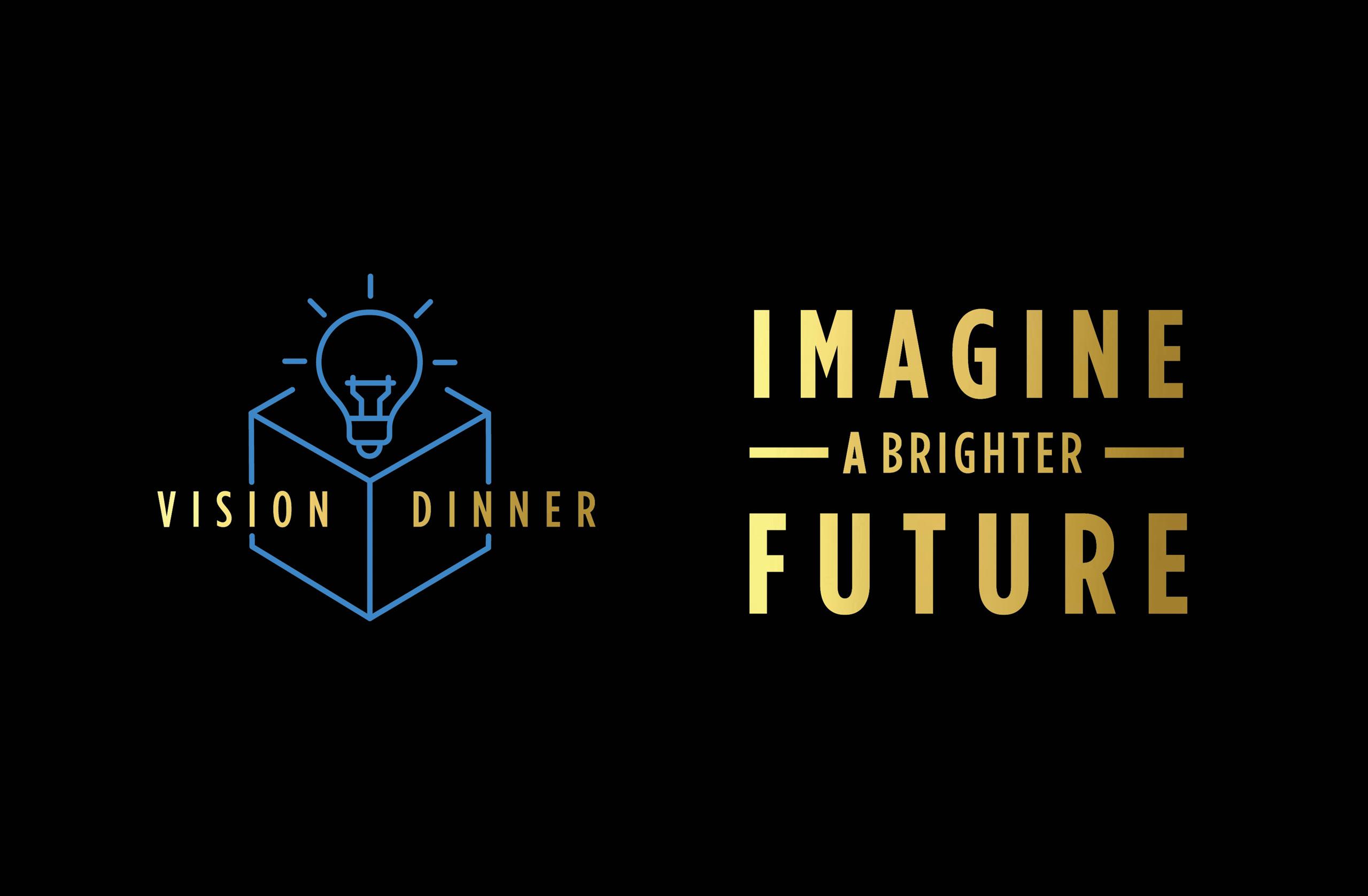

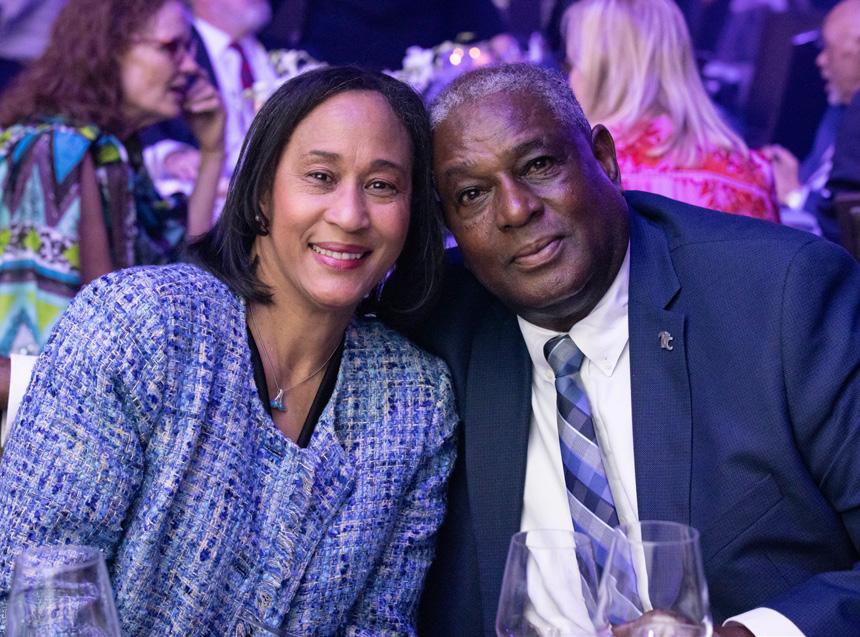
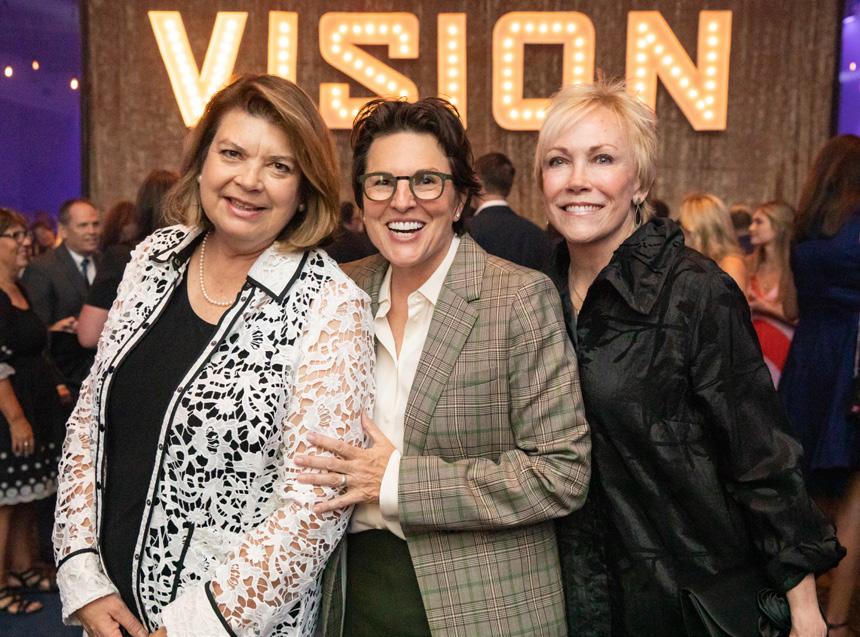


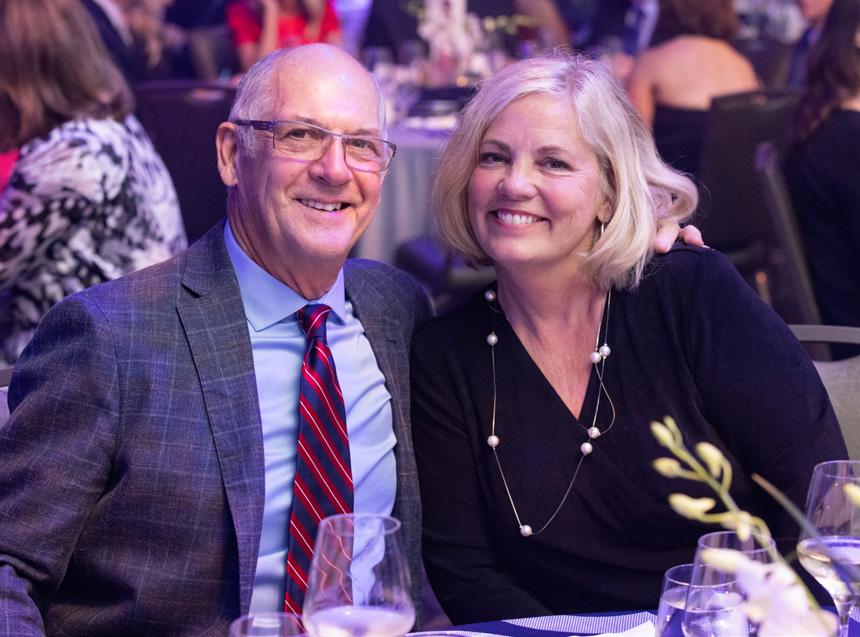
The Tulsa Community College Foundation broke an all-time fundraising record at the 2023 Vision Dinner, with more than $550,000 raised, including more than $125,000 for the Vision Dinner Scholarship fund.
Vision Dinner raises funds every year to support students through scholarships, internships, new learning equipment and more, and recognizes leaders who champion education.
This year’s event, co-chaired by Brenda and Curtis Dinan, occurred in early September at the Cox Business Convention Center in downtown Tulsa. It featured performances from the TCC Concert Choir, TCC Student String Quartet and an original, digital animation created by students and faculty.
The 2023 honorees were Billie Barnett, a community leader and TCC Foundation trustee; Howard Barnett, business leader and former president of OSU-Tulsa; Pierce Norton, CEO of ONEOK; and Joshua Paredes, a TCC graduate and co-founder of “Don’t Clock Out”, a suicide prevention organization for healthcare workers. Paredes was the 2023 Momentum Award winner.
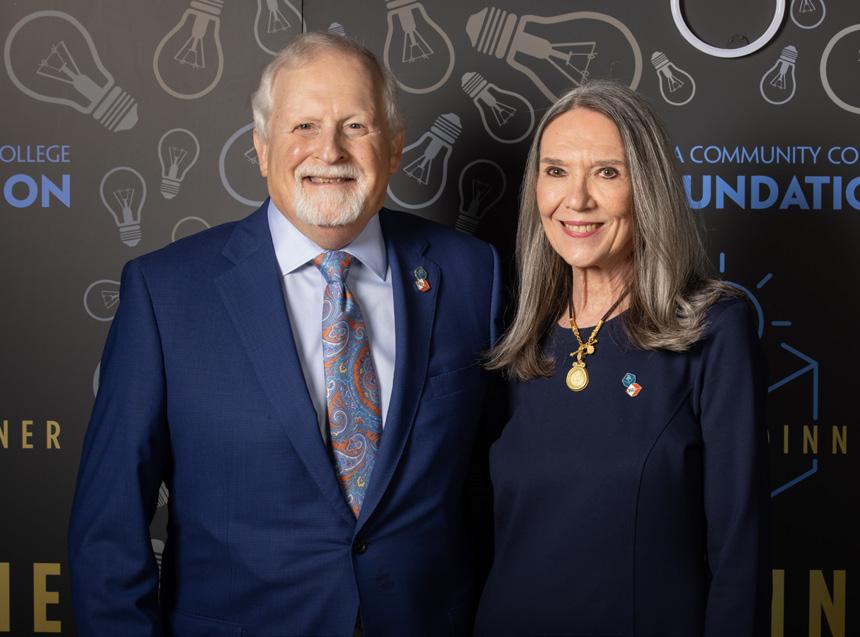
“We are proud to honor these individuals who have shown, through their service and generosity, their dedication to education and the Tulsa community,” said Dr. Leigh Goodson, TCC president and CEO.
“Our students are successful because our donors believe in the power of education and what TCC can do for this community.
Ninety percent of TCC graduates stay in Tulsa, further strengthening our local workforce.”
Attendees at Vision Dinner helped raise more than 80 scholarships worth $1,500 each during the Live Ask. Recipients of these scholarships are students outside of Tulsa County who do not qualify for the Tulsa Achieves Scholarship.
“We doubled last year’s number of scholarships raised at Vision Dinner, while breaking attendance and fundraising records,” said Kari Shults, TCC vice president of advancement and TCC Foundation president.
“This work is only possible through the community support and generosity of our donors.”
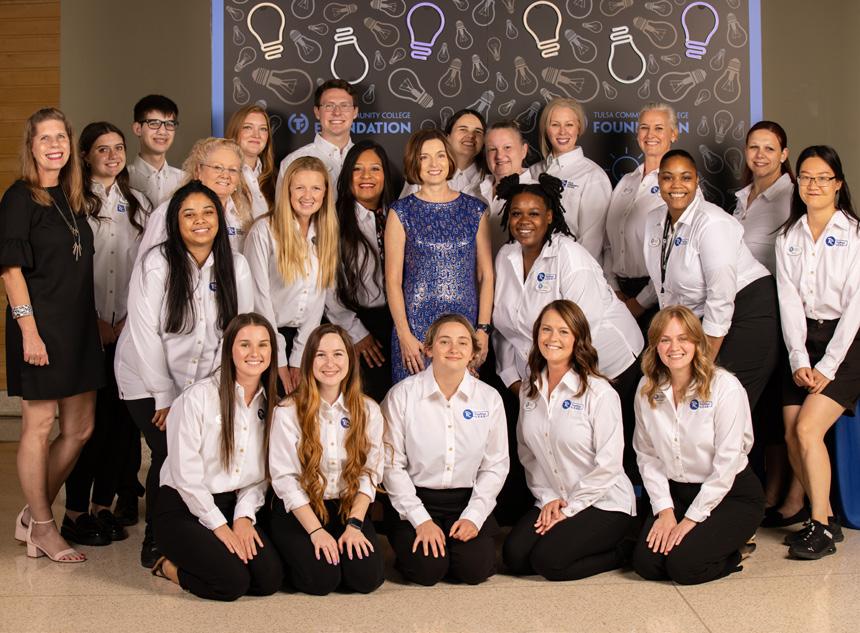

25 Community Magazine | Spring 2024 | tulsacc.edu
The Tulsa Community College Foundation provides support to Tulsa Community College and its mission by developing key relationships and financial resources.
2024 TCC Foundation Board
effective January 1, 2024
Executive Committee
CHAIR: Dr. Eleanor Payne, Retired Educator
VICE CHAIR: Sarah Hansel, Attorney/Director, Hall Estill Attorneys at Law
SECRETARY/TREASURER: M. Susan Savage, CEO, Morton Comprehensive Health Services, Inc.
PAST CHAIR: Jesse Guardiola, VP of Community Relations & Impact, Tulsa Area United Way
Trustees
Scott Asbjornson, Investor
Billie T. Barnett, Civic Leader
Marissa Blevins, Director of HR Operations, The Williams Companies
Konnie Boulter, Program Director, The Oxley Foundation
Jeff Brooks, Chief Information Officer, Muscogee Creek Nation Casinos –River Spirit
Bob Bush, President and CEO, Community Care
Teresa Meinders Burkett, Partner, Conner & Winters, LLP
Lisette Coston, Executive Director of Support Services, Saint Francis Health System
Sharon King Davis, Partner, King Investments
Curtis Dinan, Senior Vice President and Chief Commercial Officer, ONE Gas
Stephania Grober, President, Blue Cross Blue Shield of Oklahoma
Kevin Gross, President & CEO, Hillcrest HealthCare System
John Hewitt, President & CEO, Matrix Service Company
Tim Jackson, Founder, Jackson Technical
Molly Jarvis, Senior Vice President, Marketing Communications and Cultural Tourism, Cherokee Nation Businesses
David Kollmann, President, Central Region, Flintco LLC
Sean Kouplen, Chairman and CEO, Regent Bank
Phil Lakin, Jr., Chief Executive Officer, Tulsa Community Foundation
Jim Langdon, Publisher, Langdon Publishing Company
William Lissau, Oklahoma Market President, Bank of America
Tim Lyons, President & CEO, TTCU Federal Credit Union
Robert Martinovich, EVP and CAO, ONEOK, retired
Susan B. Neal, Executive Director, Gilcrease Museum and the Helmerich Center for American Research. Vice President for Public Affairs, The University of Tulsa
Karl Neumaier, Community Volunteer
Tina Patel, CFO, Promise Hotels, Inc.
Jackie Price Johannsen, President, Price Family Properties
Roger Ramseyer, Vice President & Tulsa
Market Leader, Cox Communications
Suzanne Reese, Retired Educator
Lou Reynolds, Senior Partner, Eller & Detrich
John Rupe, Jr, CEO, Rupe Helmer Group
Dawne Stafford, CEO, Security Bank
David Stewart, Chief Administrative Officer, MidAmerica Industrial Park
Melinda Stinnett, Senior Managing Director, CBIZ Stinnett
Casey Stowe, SVP, Finance and Real Estate, PartnerTulsa
David Stratton, Executive Vice President, Tulsa Commercial Banking, Bank of Oklahoma
Ashley Townsend, Vice President, JPMorgan Chase & Co.
Staff
Leigh B. Goodson, Ph.D, President & CEO, TCC
Kari Shults, VP of Advancement and President of the TCC Foundation
Mark McMullen, CFO, TCC
Mackenzie Wilfong, General Counsel, TCC
Megan Korn, Chief Development Officer
Nicole Burgin, Development Officer
Bethany Weaver, Foundation Controller
Caitlin Rommel, Assistant Controller
Jill Deutscher, Database Administrator
Kayleigh Land, Coordinator
Sally Osburn, Foundation Board Liaison, part time
Tulsa Community College Foundation: 909 S. Boston Ave., Tulsa, OK 74119 • Phone: (918) 595-7977 • www.tccfoundation.org
President’s Society
President’s Society members contribute a minimum of $1,000 to the TCC Foundation annually. President’s Society provides the College with resources needed to take advantage of unique and often unforeseen opportunities and quickly address critical needs that may otherwise go unanswered. President’s Society membership term is based on the calendar year and membership may remain anonymous.
Join TCC’s President’s Society and attend special events throughout the year, connecting with President Leigh Goodson about how your support impacts programming for TCC students.
Membership Levels
PRESIDENTIAL LEVEL:
Individuals and businesses $10,000+
EXECUTIVE LEVEL:
Individuals and businesses $5,000–$9,999
PLATINUM LEVEL:
Individuals and businesses $2,500–$4,999
GOLD LEVEL:
Individual donors $1,000–$2,499
2024
President’s Society Members as of 1/11/24
Thank you to our current President’s Society members for their support of TCC students and academic programs! Your contributions help put students on pathways to success.
To join the President’s Society, scan the QR code below.
Presidential Level
Ruth Nelson Family Foundation
Executive Level
George Krumme
Jim and Ronda Norton
Gold Level
Montie1 and Betty Box
Dr. Jennifer Campbell and Dr. Brett Campbell
Dr. Chandra Carpenter
Dr. Kristopher and Ranee Copeland
Lisette and Brad Coston
Don Crall
Ramona Curtis
Dr. Peggy Dyer
Marge and John Gaberino, Jr.
Julie Hall
Tracy Jackson
Molly Jarvis and Chuck Rutterford
Megan and Kiley Korn
Phil Lakin
Jim Langdon and Juley Roffers
Ron and Susie Looney
Meshri Family
Dr. Carol Messer
Rick and Susan Neal
Tony O’Connor
Dr. Matt Olsen
Susanne and Millard Pickering
Julie and Justin Porterfield
David and Cheryl Poth
Roger and Terri Ramseyer
Michael and Cathryn Render
John and Stephanie Rupe
Kari and Matt Shults
Dr. Angela and Mary Sivadon
Dawne and Robert Stafford
Dr. Eunice Tarver
Sean Weins
Dr. Lindsay White and Dr. Travis White
Mackenzie and Erin Wilfong
Lifetime Members
Robin Ballenger
Howard and Billie Barnett
Konnie Boulter
The Honorable Terry Kern and Mrs. Jeanette Kern
Caron and Shawn Lawhorn
Bill and Pat McKamey
Dr. Frank and Mrs. Mary Baker Shaw
Jana Shoulders
State Farm Insurance Company
Note:Lifetimemembershipsare nolongeravailable
27 Community Magazine | Spring 2024 | tulsacc.edu
1 Donor is deceased
909 S. Boston Ave. Tulsa, OK 74119 www.tulsacc.edu NON-PROFIT ORGANIZATION U.S. POSTAGE PAID TULSA, OK PERMIT NO. 428 0 $10,000 $20,000 $30,000 $40,000 $50,000 $28,310 Tuition & Fees $29,216 Housing & Meals $57,526 Total Two-Year Cost $27,840 Tuition & Fees $22,600 Housing & Meals $50,440 Total Two-Year Cost $15,200 Tuition & Fees $19,020 Housing & Meals $34,220 Total Two-Year Cost $16,520 Tuition & Fees $20,988 Housing & Meals $37,508 Total Two-Year Cost $8,760 Tuition & Fees $8,760 Total Two-Year Cost $0 Total Two-Year Cost COLLEGE COST COMPARISON: FIRST TWO YEARS INCLUDES TUITION & FEES, HOUSING & MEALS* *Total noted pulled from individual college websites as of 7/26/2023 and reflect two years in college housing.



































